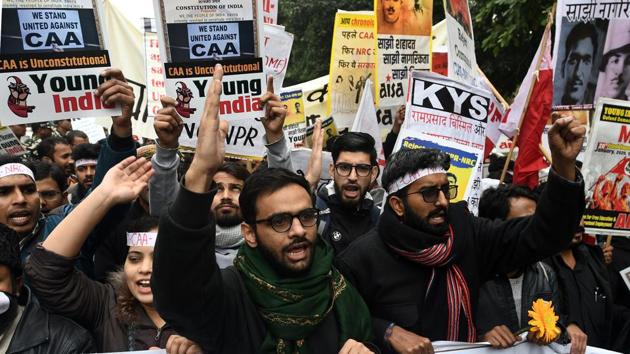Delhi riots: Govt sanctions sedition charges against Umar Khalid, Sharjeel Imam, others
At least 53 persons died while 400 others were injured when clashes turned violent leading to full-blown Hindu-Muslim riots across parts of northeast Delhi.
The Delhi government on Wednesday gave its sanction to the police to charge 18 people accused in the Delhi riots case -- including former JNU students Sharjeel Imam, Natasha Narwal, Devangana Kalita, former JNU student Umar Khalid, and local politicians Tahir Hussain and Ishrat Jahan -- under sections of the Indian Penal Code that deal with sedition and criminal conspiracy.

On November 22, when Delhi Police charged Khalid and other accused for their alleged role in the case, they informed the court that the sanction to prosecute the accused persons for sedition and other sections was still under consideration.
A court takes cognisance of the charges and starts trial only after the state government gives a prosecution sanction.
The police had sent a request for the prosecution sanction under sedition in mid- September.
Last month, the government had given police prosecution sanction to charge the accused persons under Unlawful Activities Prevention Act. But the sanction for sedition was still awaited.
The accused have been arrested for their alleged role in conspiring to orchestrate the riots in northeast Delhi -- a charge that they have vehemently denied. The arrested have alleged that police framed them in the Delhi riots cases because they were prominent faces of the anti-Citizenship (Amendment) Act protests.
At least 53 persons died while 400 others were injured when clashes turned violent leading to full-blown Hindu-Muslim riots across parts of northeast Delhi.
According to the Delhi government’s sanction approval letter, the police’s charge sheet was vetted, and after perusal it appeared that “prima facie the accused persons had committed the acts of sedition and criminal conspiracy.” HT has seen a copy of the government’s sanction letter.
The government has also written to police saying that the granting of the prosecution sanction has been approved by lieutenant governor Anil Baijal.
The Delhi government did not respond to requests for comment.
The sedition law under Section 124 is a British era law, mentioned in the Indian Penal code. The maximum punishment, if convicted under the section, is life imprisonment with fine.
This is the second case in which Umar Khalid will be tried for sedition. He, along with former JNU students’ union president Kanhaiya Kumar, was booked under a sedition charge for allegedly shouting anti-India slogans in the 2016 JNU case. They have both denied the charges.
A controversy had erupted during that case when the Delhi government said police filed a charge sheet in January 2019 without getting an approval from the state government to include the sedition charge. The court did not take up the case until the government finally granted sanction in February 2020.
Former Uttar Pradesh police chief, Vikram Singh who served as the state’s director general between 2007 and 2009 said, “ The government must not delay in granting sanctions in cases such as this. The government has the best legal minds. If there is a lacunae in the case, the legal minds can fix it. Many times governments delay sanction because of vote bank politics. Delaying the sanction hurts the government and the victims at large. The trials get extended. Ultimately the government suffers losses when trails are delayed. “




